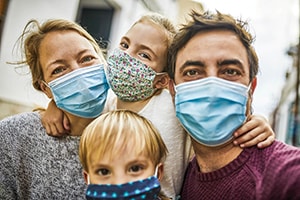Delta cases in children are making it worse
By Liora Engel-Smith/VTDigger
Laura Derrendinger cared for patients with measles and cholera in war-torn countries, but the scenario that scares her the most is much closer to home.
She’s lived the nightmare several times in recent years. Her 5-year-old, Pascal, gets hypoxic (faces inadequate levels of oxygen) every time he gets a cold.
“There’s nothing as a mother that is more frightening than what you go through if you’re in an emergency room and the doctor says, ‘We need to put you on a helicopter to send you to a bigger hospital so we can intubate your child,’” said Derrendinger, who lives in Middletown Springs.
Derrendinger is determined to protect her child — and his three siblings — from Delta, a highly contagious strain of Covid-19 that infects more children than previous versions of the virus.
Vermont Dept. of Health data show a dramatic rise in coronavirus infections among children. The infection rate of children 9 and under has risen since last year from eight cases per 10,000 kids up to 331, a 41-fold increase. Coronavirus cases for children and adolescents ages 10-19 — many of whom are vaccinated — have also spiked from 14.3 per 10,000 kids up to 527, a 36-fold rise.
Derrendinger has taken drastic measures to protect her kids. The family has tried to isolate as much as possible. The children spend the bulk of their time outdoors. Derrendinger and her family, who lived in France at the beginning of the pandemic, even moved to Vermont specifically so the children could attend a school that offers year-round outdoor learning.
Doctors who care for Vermont’s children say they’re seeing some of the implications of that parental caution. The state has yet to have a pediatric ICU case of Delta, Health Commissioner Mark Levine said last week. However, outpatient clinics have been inundated with children who have respiratory infections.
“We’re probably at 150% capacity and we weren’t necessarily well prepared [for that], but we’re making it work,” said Elizabeth Hunt, a pediatrician at University of Vermont Health Network’s Timber Lane Pediatrics, a roughly 1,000-patient clinic with three locations in Chittenden County.
Coronavirus testing in that age group likewise has increased dramatically. Roughly 450 children under 17 have been diagnosed with Covid-19 in August, according to data obtained from the state, but 4,400 children and adolescents were tested the week of Aug. 16 alone.
That rise coincides with the usual increase in pediatric visits every summer. Children are out of school and more prone to injuries — from sunburns to falls to car accidents and bike injuries. Families also try to get back-to-school and sports physicals during that time, adding to the increased demand.
This year, however, children with viral respiratory infections — including croup, RSV and rhinovirus — are also showing up at clinics in higher numbers than usual, not only because parents are concerned about Delta infections but because more children than normal are catching respiratory illnesses this summer, Hunt said.
Hunt practices in an area of the state that has the most primary care providers, according to a 2018 state physician census. The uptick of childhood respiratory illnesses outside of populous Burlington, where physicians aren’t as plentiful, means some pediatricians are already at capacity.
‘All hands on deck’
Meredith Pickard — a registered nurse at Northern Express Care, an urgent care clinic that serves the cluster of rural counties in the Northeast Kingdom — has also seen an uptick in pediatric patients with respiratory symptoms. Data from the Federal Health Resources and Services Agency shows the clinic is one of very few options for primary care there.
Clinics there were already stretched thin before the pandemic. The vast majority of primary care practitioners aren’t taking new patients, the 2018 physician census shows.
Express Care is one of the few places outside of a hospital emergency department where patients can be seen quickly. With more children coming into the urgent care clinics for respiratory illnesses, patients there may have to wait longer to be seen. On an average day, that might mean an extra 10 minutes to half an hour of waiting, though some have to wait longer, Pickard said.
Responding to the growing need demands an “all hands on deck” approach at a time when medical staff is already battling pandemic-related burnout, she said.
“It might mean pulling in different providers and pulling in reception people to help with clinical [staff],” she said. “It’s working on fumes right now.”
A backlog of needs
Tracy Tyson’s practice at Northwestern Pediatrics is already past the fumes stage that Pickard of Northern Express described.
Tyson’s rural clinic, which serves 6,000 patients across six locations in St. Albans City and surrounding areas, is chronically short-staffed.
In addition to the uptick in respiratory illnesses and coronavirus vaccine conversations with hesitant parents, the clinic’s six pediatricians are trying to catch up on missed wellness visits for patients who couldn’t or wouldn’t come earlier on in the pandemic.
Many patients also need more support for depression, anxiety and suicidal thoughts.
Even with extended hours, double-booking and triaging appointments, staff members can’t seem to catch up.
“It’s emotionally, physically and compassionately draining,” she said. “I do find that I want to say ‘yes, I’ll do more’ and I find that I just can’t. I hit a wall and I can’t do any more.”




